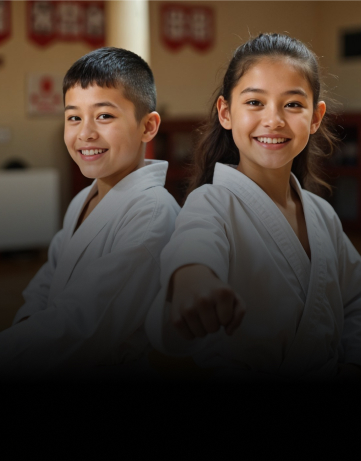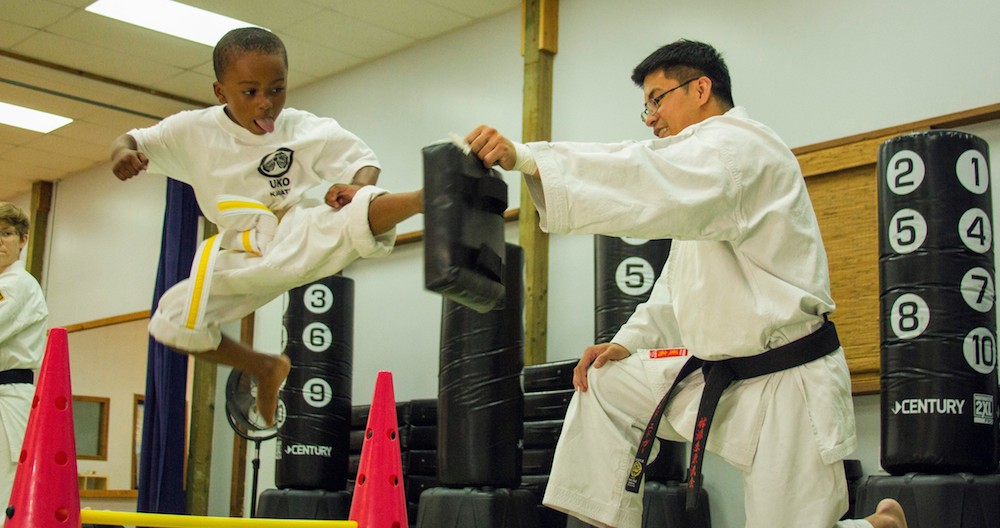Best Karate for kids – Trusted by Parents, Enjoyed by Kids
Best Karate for kids – Trusted by Parents, Enjoyed by Kids
Blog Article
How Karate for Kids Can Boost Self-confidence and Discipline in Youthful Martial Artists
Karate for children provides an unique chance to build self-confidence and self-control in young martial artists. As they find out new methods and face difficulties, they not just acquire skills however additionally establish a solid sense of self-regard. This structured atmosphere motivates them to respect the trip of improvement. However just how does this training translate into their daily lives? Discover the much deeper links that make karate greater than just a sport.
The Importance of Confidence in Childhood Growth
Confidence is an important foundation in childhood growth. When you support your kid's self-worth, you equip them to face difficulties, take risks, and express themselves freely. Youngsters with confidence are a lot more happy to check out social situations and new activities, which can lead to enduring relationships and important experiences.Encouraging your youngster to tip out of their comfort area promotes durability. They learn that failing isn't completion yet rather a tipping rock to success. By celebrating their achievements, no matter exactly how tiny, you assist them identify their capacities and worth.In this journey, assistance and favorable reinforcement from you play an essential duty. Whether it's through praise or simply being existing, your involvement increases their self-confidence. As they grow, this confidence comes to be a lifelong asset, equipping them to navigate both obstacles and opportunities with a solid feeling of self.
Just How Karate Instructs Technique and Emphasis
Martial arts helps you develop self-control and emphasis via its organized training routine. As you exercise mindfulness during each session, you'll discover to focus much better both on and off the floor covering. Plus, establishing and accomplishing objectives in martial arts strengthens your capacity to stay mindful and dedicated.
Structured Training Program
While you engage in karate training, you'll quickly uncover how an organized regimen infuses discipline and emphasis in young specialists. Each class adheres to a specific format, including workouts, method method, and sparring. This consistency teaches you to respect the process and commit to renovation. As you learn types and strategies, you create a feeling of obligation for your very own progress.The organized environment urges you to set objectives, whether understanding a new belt or perfecting a kata. You'll find that staying concentrated during courses and drills sharpens your focus. The technique you grow in karate prolongs beyond the dojo, favorably affecting your schoolwork and daily routines. Each session enhances the value of devotion, helping you turn into an extra regimented individual.
Mindfulness in Technique
As you practice martial arts, you'll locate that mindfulness becomes an important part of your training. Each action needs your complete focus, assisting you stay concentrated on today minute. You'll find out to ignore disturbances and focus on your breathing, movements, and purposes. This increased understanding develops your reflexes and enhances your discipline.During sparring or kinds, you'll discover the significance of being emotionally existing - Karate Salisbury MD. You'll see how this emphasis not just boosts your strategy but likewise develops your self-confidence. By practicing mindfulness in karate, you grow patience and durability, crucial qualities that extend past the dojo. This way, martial arts instructs you to harness your mind, aiding you establish a disciplined technique to difficulties both on and off the mat

Setting Goal Techniques
Establishing goals in martial arts isn't almost gaining belts; it's an effective means to cultivate self-control and focus. When you establish certain, possible targets, you develop a roadmap for your progress. For circumstances, rather than simply aiming to boost your kicks, attempt concentrating on mastering a specific strategy every month. This approach keeps you motivated and engaged.Breaking down bigger goals into smaller, workable steps helps you track your progression and celebrate small triumphes in the process. Whether it's developing your stance or enhancing your sparring endurance, every goal reinforces your dedication. As you attain these objectives, you'll construct confidence in your skills and create a solid sense of technique that extends beyond the dojo into daily life.
Building Strength Via Martial Arts
Fighting style, especially martial arts, offers youngsters an one-of-a-kind chance to construct durability in a supportive atmosphere. In classes, they encounter challenges that push their limitations, whether it's competing or grasping a brand-new technique with a companion. Each setback, like a missed kick or a lost match, becomes a possibility to learn and grow.As they practice, kids discover to embrace pain and keep trying, even when points obtain tough. They discover that failing isn't the end; it's component of the journey. This frame of mind assists them bounce back more powerful, not simply in the dojo, however in daily life.With each difficulty they conquer, your youngster develops self-confidence in their ability to deal with challenges, fueling their determination. With karate, they'll recognize that durability isn't almost physical strength; it's regarding mental grit and willpower, equipping them to deal with whatever life throws their method.
The Function of Respect in Martial Arts Educating
Respect is a fundamental principle in karate training, fostering a society of discipline and sociability among trainees. When you step onto the dojo flooring, you're not simply learning strategies; you're likewise discovering to appreciate your teachers, peers, and the art itself (Karate Salisbury MD). Bowing at the start and end of course isn't just a formality; it represents your recommendation of others' dedication.as and initiatives you develop mutual regard, you'll find it improves your discovering experience. You'll listen a lot more attentively to your instructor and gain insights from fellow students. This setting encourages constructive criticism and support, allowing everyone to grow together.Moreover, respect grows self-control. Recognizing the value of effort and humbleness helps you remain concentrated on your training. Consequently, this respect equates into your day-to-day life, improving your communications and partnerships outside the dojo. With karate, you find out that regard is important for personal development and neighborhood structure
Setting Goals and Attaining Success in Martial arts

Social Skills and Team Effort in the Dojo
While training in the dojo, youngsters naturally establish important social skills and team effort abilities. As they practice along with peers, they learn to interact effectively, share space, and support one another. Each course provides possibilities for cooperation, whether it's during companion drills or team exercises. This teamwork promotes friendships and creates a sense of belonging, making the dojo a nurturing environment.Kids likewise obtain useful dispute resolution skills. When they experience difficulties, such as disagreements during sparring, they discover to navigate these scenarios constructively. They exercise perseverance and empathy, comprehending that everyone has various strengths and weaknesses.Moreover, getting involved in group activities cultivates a sense of liability. You'll see your kid finding out to count on colleagues and take duty for their role in a group. These experiences not only enhance their martial arts trip but also equip them with social tools they'll carry right into various other locations of life.

The Long-Term Conveniences of Karate Beyond Childhood
As kids mature and move into the adult years, the about his advantages of karate expand far past the dojo. You'll find that the discipline and focus found out via karate can convert right into your scholastic and professional life. Setting and attaining objectives in fighting styles cultivates a strong work principles, which can push you to master any kind of endeavor.Moreover, the confidence acquired from understanding strategies and competing can improve your self-esteem, assisting you take on challenges head-on. This strength becomes important as you encounter the unpredictabilities of adulthood.Additionally, the social abilities created through teamwork and camaraderie in the dojo can cause far better connections in both personal and specialist spheres. You'll discover to communicate efficiently, willpower conflicts, and construct an encouraging network.Ultimately, karate forms not just proficient martial artists, but well-shaped people prepared to take on the world.
Often Asked Inquiries
What Age Is Best to Beginning Martial Arts for Kids?
You can start martial arts as early as age four or five, however it commonly relies on your child's maturation and passion. Locating a course that matches their age and power degree makes a huge difference.
Are There Any Kind Of Wellness Perks From Exercising Martial Arts?
Yes, exercising karate offers various wellness advantages. You'll improve your coordination, stamina, and flexibility while enhancing cardio fitness. Plus, it improves emphasis and psychological health, making it a wonderful choice for total physical and psychological health and wellness.
Just How Commonly Should Children Participate In Karate Courses?
You ought to urge your children to attend karate classes at the very least 2 to 3 times a week. Consistency assists them learn methods effectively and create abilities, making their experience extra satisfying and satisfying in the lengthy run.
Can Karate Aid With Managing Anxiety in Kid?
Yes, martial arts can help take care of anxiety in children. It shows focus and self-discipline while supplying a secure outlet for energy. You'll see your youngster growing extra certain and calm as they practice routinely.
What Gear Is Required for Kids Starting Martial Arts?

Report this page